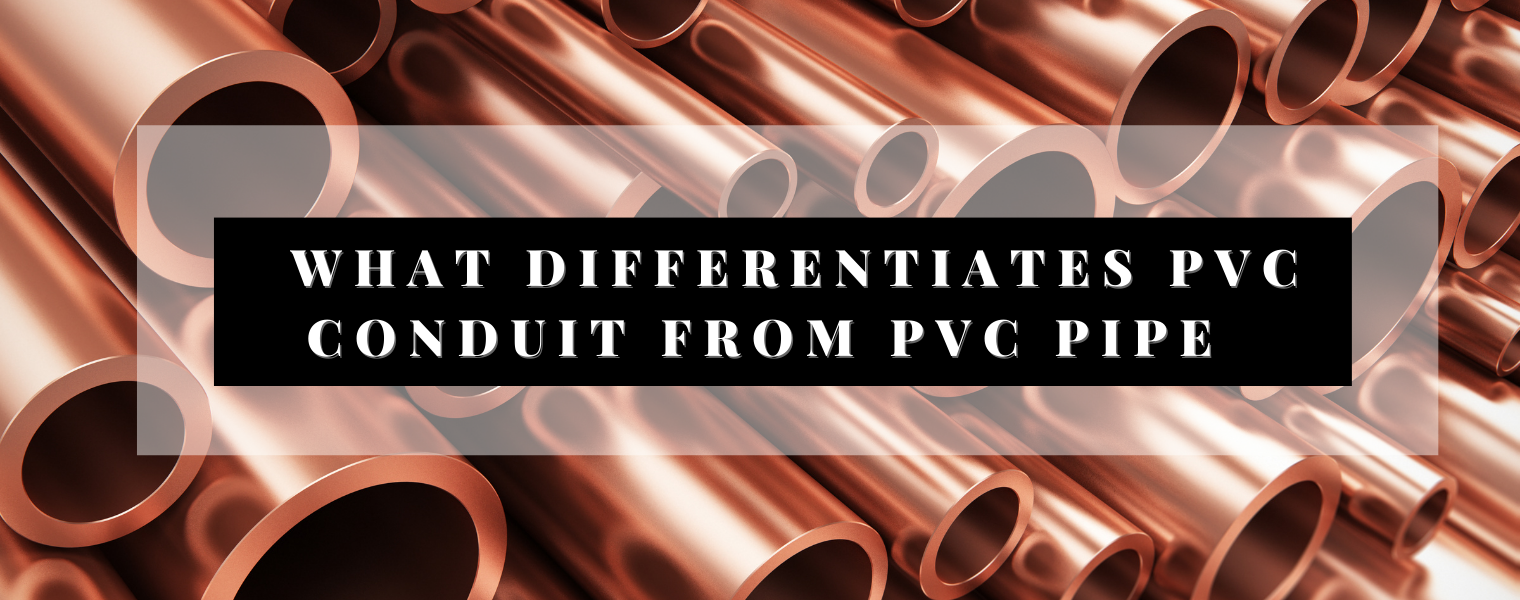
PVC pipes are created by combining plastic and vinyl to form polyvinyl chloride (PVC). In place of more expensive copper piping, these popular pipe types are frequently utilized in plumbing. Electrical conduit is also made from PVC. Although both electrical conduit PVC and normal PVC are constructed of the same kind of plastic, they are not the same and shouldn't be used for the same purposes. Each should be used specifically and not interchangeably.
Based on consumption. PVC pipes are thicker than conduits, as you may have noticed. The PVC pipes have a sturdy design as a result of their special operating circumstances. The pressure will determine whether or not we employ PVC pipes in plumbing systems. The pipes cannot sustain the pressure if they are not the desired thickness.
They will wear out and could not provide the greatest advantages. PVC conduits don't require a thick design, though. They won't need to contend with strong water pressure. As a result, they are not as durable as PVC pipes. The use of PVC conduits in electrical systems is supported by their thickness.
The major distinction here between PVC pipe and PVC conduit is pressure. It is important to note that, unlike PVC pipe, PVC conduit will not undergo a pressure testing procedure. As was already noted, PVC pipes are used in plumbing systems. As a result, the pipe must be sturdy enough to sustain water pressure.
You can't expect increased performance, reliability, or longevity if the pipe isn't strong enough to resist the water pressure. You cannot use a PVC conduit in your plumbing because it cannot withstand water pressure. Irrespective of the pressure level, PVC pipes may survive a long time and serve you well.
The usage will differ even if the manufacturing element is the same. As was already said, plumbing systems require PVC pipes. PVC pipes can be utilized in any other pressured system. A PVC conduit, however, works well in electrical systems. The DoFort can be used to produce lasting results and enhance performance.
Regarding PVC pipes, you can utilize them to transport water. However, PVC conduits can be used in wiring. These two categories differ greatly from one another. PVC pipes can occasionally be used in electrical installations. Yet, it must adhere to safety standards for flame or temperature resistance.
These thermoplastic alloys are produced by mixing PVC with complementary modifying agents. The modifying chemicals increase the material's ductility, fracture toughness, and resilience to crack propagation. They also enhance the material's toughness and impact properties. Because of their increased durability, modified PVC pipes can be produced with thinner walls, which results in material savings and better hydraulic capabilities. PVC can be modified with other polymers to increase its resistance to cracking. As a result, the impact of stress concentrators like scratches is minimized.
PVC will be used for both pipes and conduits, as was already specified. But you can't apply them to every situation. The sunlight and Ultraviolet rays are too strong for the PVC pipes. Therefore, you are unable to utilize them outside of your residence.
They cannot be utilized on rooftops either. The greatest pipes for plumbing systems, however, may be PVC ones. They are resilient to high water pressure. As a result, you can anticipate improved functionality and durability. One can use the PVC pipes, which are thicker, in your water and drainage systems. You might also think about utilizing them for ventilation. In addition, sewage systems can employ these pipelines. However, you must refrain from utilizing them in a space that receives direct sunlight.
For some particular applications, PVC conduits and pipes can both be the best options. They can be utilized both at home and in the workplace. It is important to note that both of these kinds are strong, affordable, and adaptable.
The one based on the needs of your application, however, is the one you must take into account. A standard PVC pipe cannot be used in electrical systems. It won't function and could result in issues. A PVC conduit cannot be used in the plumbing, either. It won't accomplish the goal. As long as you use them in the right settings, you should be able to get the needed advantages and durability.
PVC Conduit and UPVC pipes are both excellent materials for residential and business applications. They are strong, adaptable, and practical to employ. Use them all, however, exactly as they were intended to be used. PVC conduit won't function well in plumbing applications, and regular PVC pipe should not be utilized in electrical applications. However, they are reliable and effective when used properly.
PVC Pipes and PVC Fittings are available in a variety of styles on the market today. Each connector is intended for a specific purpose and application, and each has advantages and disadvantages. There are many manufacturers and distributors of PVC fittings. If you want top-notch items for your project, be sure to choose PVC pipe , PVC Fittings and HDPE pipe and fittings from the best PVC and HDPE pipe manufacturers.
Polyfab is a well-known distributor and manufacturer of high-quality PVC pipes and fittings in Kenya, Ethiopia, Ghana and other regions internationally. Our PVC pipes and fittings have high durability which makes them the customer's first choice in Ethiopia, Kenya, and Ghana. Contact our sales team to know more about PVC pipes and Fittings.